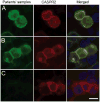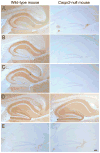Investigations of caspr2, an autoantigen of encephalitis and neuromyotonia
- PMID: 21387375
- PMCID: PMC3059252
- DOI: 10.1002/ana.22297
Investigations of caspr2, an autoantigen of encephalitis and neuromyotonia
Abstract
Objective: To report clinical and immunological investigations of contactin-associated protein-like 2 (Caspr2), an autoantigen of encephalitis and peripheral nerve hyperexcitability (PNH) previously attributed to voltage-gated potassium channels (VGKC).
Methods: Clinical analysis was performed on patients with encephalitis, PNH, or both. Immunoprecipitation and mass spectrometry were used to identify the antigen and to develop an assay with Caspr2-expressing cells. Immunoabsorption with Caspr2 and comparative immunostaining of brain and peripheral nerve of wild-type and Caspr2-null mice were used to assess antibody specificity.
Results: Using Caspr2-expressing cells, antibodies were identified in 8 patients but not in 140 patients with several types of autoimmune or viral encephalitis, PNH, or mutations of the Caspr2-encoding gene. Patients' antibodies reacted with brain and peripheral nerve in a pattern that colocalized with Caspr2. This reactivity was abrogated after immunoabsorption with Caspr2 and was absent in tissues from Caspr2-null mice. Of the 8 patients with Caspr2 antibodies, 7 had encephalopathy or seizures, 5 neuropathy or PNH, and 1 isolated PNH. Three patients also had myasthenia gravis, bulbar weakness, or symptoms that initially suggested motor neuron disease. None of the patients had active cancer; 7 responded to immunotherapy and were healthy or only mildly disabled at last follow-up (median, 8 months; range, 6-84 months).
Interpretation: Caspr2 is an autoantigen of encephalitis and PNH previously attributed to VGKC antibodies. The occurrence of other autoantibodies may result in a complex syndrome that at presentation could be mistaken for a motor neuron disorder. Recognition of this disorder is important, because it responds to immunotherapy.
Copyright © 2011 American Neurological Association.
Conflict of interest statement
EL has received grant support from Talecris, a company which sells human immunoglobulin. A patent application for the use of Lgi1 antibody detection in patients’ CSF and sera has been filed by JD. No other authors have conflicts of interest.
Figures




References
-
- Buckley C, Oger J, Clover L, et al. Potassium channel antibodies in two patients with reversible limbic encephalitis. Ann Neurol. 2001;50:73–78. - PubMed
-
- Tan KM, Lennon VA, Klein CJ, et al. Clinical spectrum of voltage-gated potassium channel autoimmunity. Neurology. 2008;70:1883–1890. - PubMed
-
- Bushara KO, Goebel SU, Shill H, et al. Gluten sensitivity in sporadic and hereditary cerebellar ataxia. Ann Neurol. 2001;49:540–543. - PubMed
Publication types
MeSH terms
Substances
Grants and funding
LinkOut - more resources
Full Text Sources
Medical
Molecular Biology Databases

